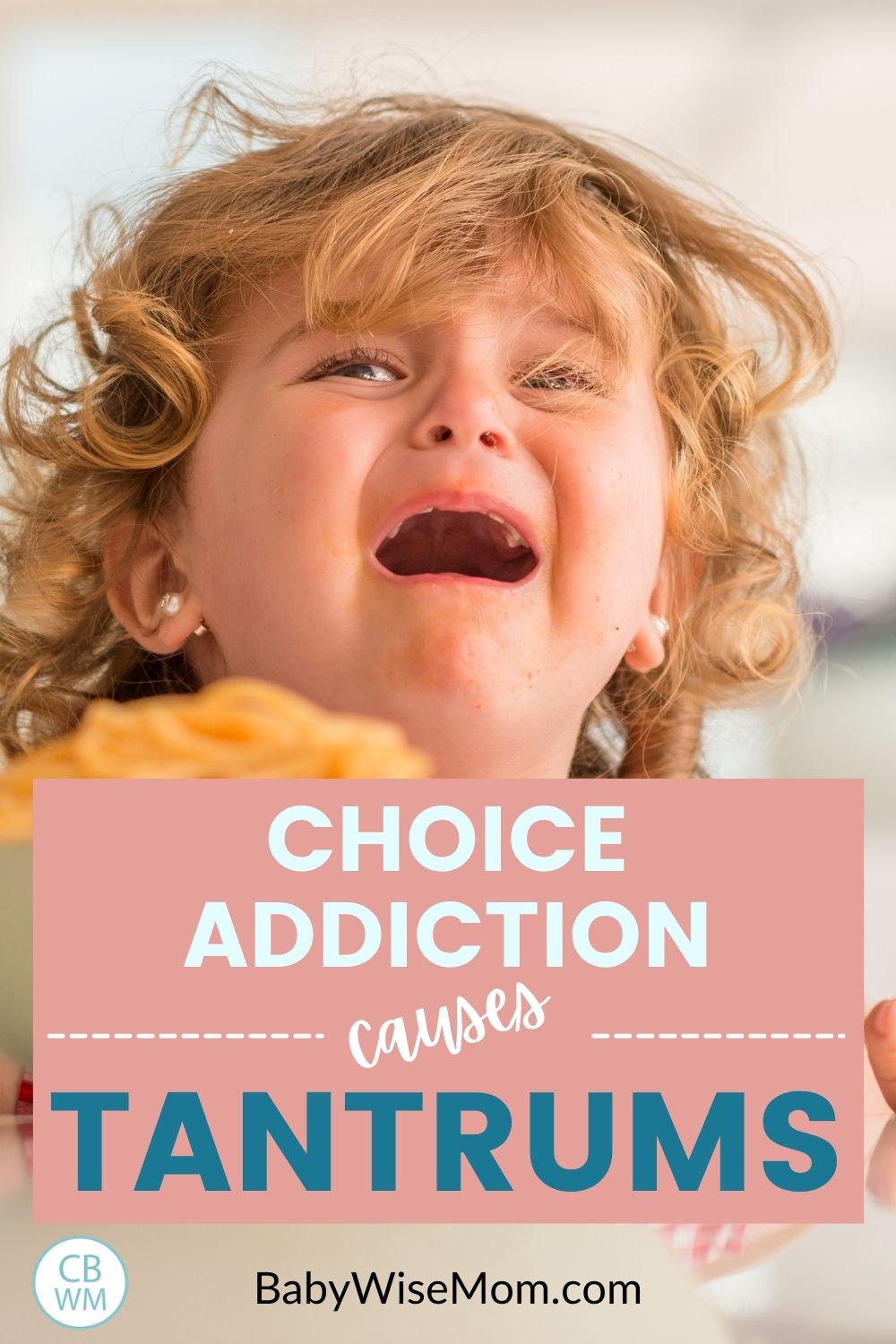Common choices given to children they shouldn’t have and how to stop the tantrums that go with them.

When a tantrum arises, there can be many causes for it.
One common cause that is wise to routinely consider is that of the “choice addiction.”
The Choice Addiction is a chapter in On Becoming Preschoolwise. I find it to be highly valuable, so I am going to summarize key points from it here. It is chapter 4 and begins on page 65.
Post Contents
Choice Addiction Explanation
What exactly is a “choice addiction”? It is when your child expects to be able to take charge of each situation and make every decision.
Then when that expectation isn’t fulfilled, a tantrum ensues.
Wise in their own eyes
You know your child is this way if he does things he shouldn’t and says things he shouldn’t.
Do you allow your child to make too many decisions? Does she have too much control for her age? You have to be careful about this.
Yes, you want your child to practice decision-making and living with the consequences of those decisions.
However, you don’t want it to get to the point that the child insists on making each and every decision.
The example used in the book is of a 4 year old insisting upon the blue instead of red cup, grape instead of the orange juice already poured, jam instead of butter, reading in the spot he choses rather than where mom chose, switching the story, etc.
All of these seemed like harmless decisions.
However, it escalates into him refusing to eat lunch because he is busy playing. The mom then wonders why he won’t obey.
>>>Read: Wise In Your Own Eyes Explained
Moral vs. nonmoral choices
The child doesn’t know yet which choices he makes are moral (obeying mom) and which are nonmoral (color of a cup).
He is so used to making every decision that he is resistant to any decision made by mom, often choosing something else just because it is different from what she chose.
Even with my oldest child, I quickly realized that the majority of the time that I experienced behavior problems with Brayden, it is because he had too many choices.
I also found this to be true with all of my girls.
I try to mix things up so an “addiction” to choices does not develop.
I do want the child to understand what it means to make a choice and what it means to follow through with that choice.
I will offer him a choice between X shirt or Y shirt.
Both are shirts I would be happy with him wearing. Whichever shirt he chooses, he wears all day (pending some good reason to change it like he spilled water all over himself or something).
He doesn’t get to choose which shirt to wear every day, just some days.
I mix up the decisions I allow him to make so that he doesn’t come to feel entitled to any.
To give your child too many choices and give too much freedom to make decisions is to push your child developmentally.
It is akin to pushing your child into an organized sport he isn’t ready to play.
Hopefully, you wouldn’t throw your child into that situation of playing a sport against kids before he is ready.
It can also be compared to getting a tutor for your 18 month old to ensure her success in school. That seems to be a little above the level of an 18 month old.
The day will come your child will mature and grow enough that he can make lots of his own choices. But he gains that ability slowly over time.
So if you start to feel guilty about not allowing so many choices, remember you are doing it for the good of your child.
Someday he will be able to chose his cup and his drink every day. For now, you only give him control as he can handle it. Keep it in the funnel.
>>>Read: Why Toddlers Really Need Boundaries

The reason for conflict with too many choices is because:
“[Your child] cannot handle the power associated with decision-making freedoms prior to the establishment of a self-regulating, moral conscience.”
On Becoming Preschoolwise (p.69)
Keep in mind that allowing too many freedoms (parenting outside the funnel) places burdens on your child.
You expect him to handle things he isn’t capable of handling. It requires him to grow up faster than necessary.
This problem starts with the parents, not the child.
This is why I say that most of the behavior problems I encounter with my kids are my fault, not theirs’s.
I have done something wrong to get us to that point. Keep that in mind.
While your child is misbehaving, it is because of something you have done, not because the child is “bad.”
The good news is that you have more control than you think. You can control yourself easier than your child.
3 Common Freedoms for Preschoolers
The three most common freedoms granted with preschoolers are decision-making freedoms, physical freedoms, and verbal freedoms. Let’s discuss each.
Decision Making Freedoms
- You want to neither over-control nor under-control.
- Be sure your child is developmentally, intellectually, and/or emotionally capable of making this decision. I think one way to gauge this is to observe how they handle the consequences of their decisions.
- How do you know if your child has too many decision making freedoms? Answer these questions. Can your child handle not being given the choice of what to eat? What about what to wear? If your child accepts your decisions without complaining, then your child can handle some freedoms in this area. If your child complains, protests, etc. then you know you have a problem.
- Does your child debate? Does he fall apart when an impulsive desire is denied? Does your child struggle to submit to instruction? Does he do what you ask, but do less than you asked for? If so, it is likely he has too many freedoms for his age.
The real world doesn’t give in to tantrums. The real world won’t tip-toe around him to avoid tantrums. You won’t be doing him any favors if you allow him too many decision making freedoms for his age.
Physical Freedoms
- Does your child inform you of what he is going to do, or does he ask for permission to do something? “I am going to play outside” vs. “May I go outside?”If it is the former, there are too many physical freedoms for your child.
- There is nothing wrong with playing outside or wanting to play outside. You just want to make sure the parent chooses if this does or does not happen.
- To keep this problem at bay, you simply require your child ask for permission rather than simply telling you. You then cannot give in if a tantrum follows the “no.” If you do, the child made the decision anyway.
Verbal Freedoms
- Too many verbal freedoms include bossiness, rudeness, demanding speech, needing the last word, telling you no, etc.
- Don’t allow your child to operate under the impression that he is your verbal peer. You are the parent.
- To fix it, you simply require a “Yes Mommy” or “Yes Daddy” in response to your instruction. Read more about that here.
- When you tell your child to respond with yes mommy, he will often be resistant, especially at first. Some moms respond to resistance by interrupting and saying, “The only response you are allowed to give me right now is “Yes Mommy” or to say “You don’t have the freedom to talk back to me.”
I remember my son would at times be resistant to saying “yes mommy”.
He didn’t talk back, he just avoided eye contact and refused to say anything.
I would wait him out. He was required to say it. He knew it.
One night when he was two months shy of three, we went to the library. On the way out, he broke free of my hand and ran to our vehicle.
I got down eye level with him. I explained to him the reasons he needed to hold my hand in the parking lot. I told him in the future, he needed to hold my hand. I told him to tell me “yes Mommy.”
He looked away and furrowed his brow. He grunted and pointed indicating he wanted to get into the vehicle.
I told him he needed to tell me “yes, Mommy” and once he did, we would get in the vehicle. I told him I would wait. He quickly looked at me and said “Yes Mommy.”
>>>Read: Discipline Phrase: “You don’t have the freedom to…”
How To Stop the Tantrums
Tantrums will come when you have a choice addiction going on. So far, we have talked about working toward avoiding a choice addiction, which avoids the tantrums.
This is your ideal situation, but in the real world, you will have times you let your child have too many freedoms.
This is common with every child. You don’t really know what your oldest should and shouldn’t have because you are a first time parent.
Your subsequent children easily get too many freedoms because it is easiest to just let them do what the older kids are doing.
Allowing freedoms is easy at the time, and sometimes we are just tired and take the easy road.
I assure you that I have realized every one of my children have had too many freedoms many times each.
Don’t feel like a failure when you realize it. It is very normal.
You can fix this, and easily. Here is how.
- You take back freedoms you have granted prematurely. Once your child demonstrates that he can accept your choices (this means no grumbling or whining), you can start to allow choices (though not the same choices every day).
- Have structure to your day. You guide your child’s activities.
- If your child throws tantrums at first, resist the urge to fix the problem. Is he throwing a fit because he wants something other than what you chose for breakfast? Don’t give in!
- Be consistent.
- It can take three days to three weeks or more to overcome.
- Remember children want to do what is right and want instruction and guidance from their parents.
Conclusion
I find this chapter so valuable because I find the choice addiction to be the root of about 90% of the behavior problems I experience with my kids. I hope you can apply some ideas to your children. Of course, this is just a summary. It is a good idea for you to read the chapter and take what you can from it.
Related Posts
- How to Know What Freedoms to Give Baby
- Start as You Mean to Go On as a Parent
- Controlling the Young Temper
- How Too Many Freedoms Leads to Disobedience
- How to Keep Siblings in the Funnel
- How to Teach a Child How to Make Decisions
This post originally appeared on this blog March 2008


